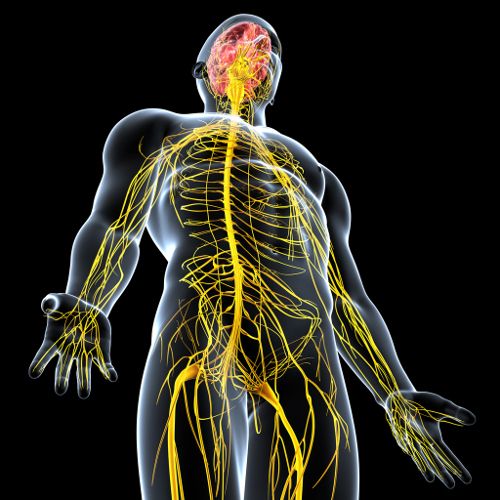What Is Nerve Damage?
https://www.doctorshealthpress.com/general-health-articles/nerve-damage-symptoms-signs/
Nerve Damage Symptoms: Signs to Watch Out For
By Mat Lecompte, CPT - October 30, 2017
Disclaimer: Results are not guaranteed*** and may vary from person to person***.
 Credit:
iStock.com/pixologicstudio
Credit:
iStock.com/pixologicstudio
The first signs of nerve damage can be pretty scary—you might notice that you’ve cut your leg but didn’t feel anything. Of course, nerve damage symptoms could be marked by the exact opposite sensation: intense pain, tingling, and burning for no known reason.
Symptoms and signs of nerve damage take many different forms because there are literally tens of thousands of nerves in your body.
An estimated 20 million Americans suffer from peripheral nerve damage, or “neuropathy.” Diabetes is the leading cause, while other causes include:
- Inheritance
- Aging
- Nutritional deficiencies
- Alcohol abuse
- Certain medications
- Infections
- Autoimmune disorders like hepatitis C, diphtheria, HIV, and rheumatoid arthritis
- No known cause (which may account for up to 30% of cases).
Your peripheral nerves are spread throughout your body. They are part of your skin, muscles, and organs.
Your brain and spinal cord send and receive messages from the nerves, allowing you to move, feel, and function properly.
When nerves are damaged, this communication cuts off, and things don’t work like they are supposed to. Movement can become much more difficult due to increasing numbness or weakness; intense pain may subsist when there is little-to-no stimuli, or you may feel nothing at all.
The Types of Nerves That Can Be Damaged
There are three types of nerves, which include:
1. Autonomic Nerves
These are the nerves that control involuntary bodily functions like heartbeat, breathing, blood pressure, digestion, and your internal temperature.
2. Motor Nerves
These nerves control movements by passing messages between your brain, spinal cord, and muscles. Picking up a cup, typing on a computer, and walking are your motor nerves at work.
3. Sensory Nerves
These nerves relay information from your skin and muscles back to your spinal cord and brain. They are responsible for pain, or the sensation you get from touching a soft blanket.
Symptoms of Nerve Damage
Nerve damage symptoms are quite diverse and they usually appear rather slowly. Because the signs of nerve damage are gradual, there is a good chance they can at least be recognized and partially treated.
At times, they will signify a greater health issue, while sometimes the symptoms may be temporary and disappear. Regardless of what symptoms you experience, it’s recommended to get to a doctor for examination.
1. Numbness, Tingling, or Burning
If you wake up with some numbness or tingling in your arms or legs, or experience it after you’ve been sitting in the same position for an extended period (like watching a captivating movie), the feelings are likely a temporary symptom of compression. And it should end within a few moments.
On the other hand, if these sensations don’t go away, it could signal nerve damage. Tingling, burning, and numbness is most often felt in extremities like your toes, feet, fingers, and hands, and have the potential to extend through your arms and legs.
If you have constant “pins and needles,” excessive burning, or limited feeling—you don’t notice when you cut yourself shaving or touch something hot—get to a doctor as soon as possible.
2. Immobility
Weakness or paralysis can occur if your motor nerves have been affected and the brain cannot get your body to move in the way you would like it to. Before nerve damage can be diagnosed, however, some other issues have to be ruled out.
It’s very important to get to a hospital if you’re having an inexplicably hard time moving because it could signal the need for urgent care: you may be having a stroke.
3. Pain down One Leg
Pain running down just one leg could be a sign of nerve damage. The pain would start in your lower back and travel down the back of one leg.
Pain could come in the form of tingling, burning or a sharp pain, and could indicate sciatica, which is the compression of the sciatic nerve. Sciatica could be caused by a slipped or worn-down disc in your spine.
4. A Little Less Sure on Your Feet
Stability issues can also be a result of nerve damage. Sometimes larger nerves that impact sensation and proprioception (your sense of the positioning of body parts) are impacted, making it harder to maintain balance and spatial awareness. Co-ordination may be impacted as well, leading to injury risks from stumbles or falls.
5. Fast, Intense Headaches
If a nerve in the neck gets pinched, you may experience shockingly painful headaches. Once again, it is wise to see a doctor—the best relief may be from a nerve-blocking injection that relieves the pain until other treatment options are established.
6. Sweating Too Much or Too Little
If you’re sweating profusely while standing outside on a cool autumn day or not sweating at all when going for a jog under the hot summer sun, it could be nerve damage.
Symptoms like this could result from dehydration or high blood pressure, but they can also indicate that the nerves carrying information from your brain to your sweat glands—which help regulate your internal temperature—are damaged.
7. Symptoms by Nerve Type
The type of symptoms you feel will largely be reflected by which nerves are damaged: autonomic, motor, or sensory nerves.
Symptoms of autonomic nerve damage include:
- Inability to sense chest pain (like angina or a heart attack)
- Too much or too little sweating
- Lightheadedness
- Dry eyes and mouth
- Constipation
- Bladder dysfunction
- Sexual dysfunction
Damage to motor nerves may be indicated by:
- Weakness
- Muscle atrophy
- Uncontrolled twitching
- Paralysis
Sensory nerve damage may lead to:
- Pain
- Sensitivity
- Numbness
- Tingling
- Burning
- Issues with positional awareness
8. Diabetes-Related Nerve Damage
As mentioned, diabetes is a major cause of nerve damage, and it’s often the result of decreased blood flow and high sugar levels.
Roughly half of people diagnosed with diabetes go on to experience some nerve damage, although symptoms don’t usually appear until long after diagnosis. Therefore, if you have diabetes, it is of increasing importance to manage blood sugar levels and weight.
In diabetics, the hands and feet are usually the first areas to suffer damage, while the nerves that control digestion are also impacted. The symptoms of digestive nerve damage include:
- Fullness after consuming only a small amount of food
- Heartburn or bloating
- Nausea, constipation, diarrhea
- Swallowing problems
- Throwing up undigested food a few hours after a meal
These are not the only symptoms diabetics may experience. They can also go through the signs of nerve damage mentioned earlier.
How to Prevent Nerve Damage
One of the best ways to prevent nerve damage is to prevent diabetes. This means eating a healthy diet that is low in refined carbohydrates like soda, candy, and chips, and choosing food with a low glycemic load.
Most fruits and virtually all vegetables and whole grains fall into this category, so they should make up the bulk of your diet if you’re aiming to prevent diabetes and the resulting risk of nerve damage.
Getting regular exercise in addition to a healthy diet can also help prevent nerve damage by promoting healthy blood pressure and weight management. If you are a diabetic, you should still work on these things in order to help control blood sugar.
Because nerve damage comes on gradually, it is best to have it diagnosed as soon as you experience the slightest concern. As is the case with most health issues, the earlier it’s recognized, the more treatment options exist.
Research on mice has indicated that omega-3 fatty acids may help regenerate cells to offer preventative measures, and potentially treatment, for nerve damage. Although more work on the topic—particularly studies in humans—needs to be accomplished, it is possible that regular omega-3 intake through diet (salmon, sardines, etc.) or supplements may help nerves strengthen.
Don’t Wait—Investigate!
Nerve damage can be a very dangerous and debilitating condition if it is left alone. Although there are no guarantees, getting to the doctor early at the first sign of nerve damage symptoms can give you the best chance at minimizing their impact on your life.
Nerve damage symptoms can show in various ways, including numbness and weakness, inexplicable severe pain, or uncontrolled twitching, so pay close attention to anything that might be out of the ordinary.
Also Read:
Nerve Flossing and Exercises for Trapped Nerve Relief
Your Antibiotics Are Damaging Your Nerves
Pain in the Neck: Is Texting behind Your Pinched Nerve?
Sources
“Nerve Pain and Nerve Damage,” WebMD, 2016; https://www.webmd.com/brain/nerve-pain-and-nerve-damage-symptoms-and-causes#1,
last accessed October 24, 2017.
“Diabetes and Nerve Damage,” The New York Times, August 5, 2014; http://www.nytimes.com/health/guides/disease/diabetic-neuropathy/overview.html,
2014; last accessed October 24, 2017.
Queen Mary, University of London, “Omega-3 fatty acids could prevent and treat
nerve damage, research suggests” ScienceDaily, January 11, 2012; https://www.sciencedaily.com/releases/2012/01/120111103856.htm,
last accessed October 24, 2017.
Harlan, C., “8 Signs You Might Have Nerve Damage,” Prevention, November 7,
2016; https://www.prevention.com/health/8-signs-you-might-have-nerve-damage/slide/1,
last accessed October 24, 2017.

Comments
Post a Comment